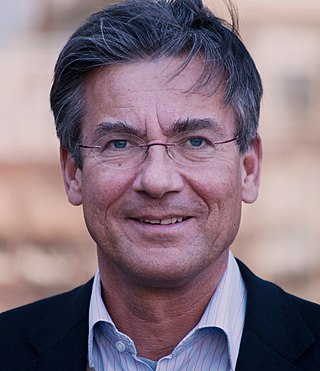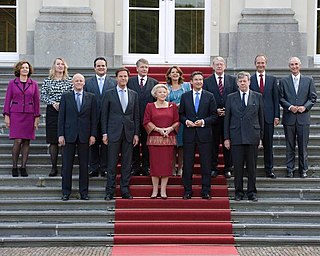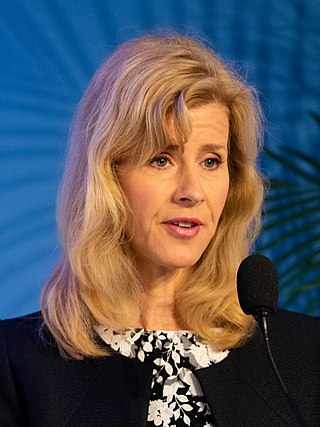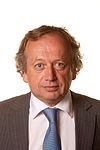
Jan Pieter "Jan Peter" Balkenende Jr. is a Dutch politician of the Christian Democratic Appeal (CDA) party and jurist who served as Prime Minister of the Netherlands from 22 July 2002 to 14 October 2010.

The Christian Democratic Appeal is a Christian democratic and conservative political party in the Netherlands.

The second Balkenende cabinet was the executive branch of the Government of the Netherlands from 27 May 2003 until 7 July 2006. The cabinet was formed by the Christian-democratic Christian Democratic Appeal (CDA), the conservative-liberal People's Party for Freedom and Democracy (VVD), and the social-liberal Democrats 66 (D66) after the election of 2003. The cabinet was a centre-right coalition and had a slim majority in the House of Representatives with Christian Democratic Leader Jan Peter Balkenende serving as Prime Minister. Liberal Leader Gerrit Zalm, a former Minister of Finance, served as Deputy Prime Minister and returned as Minister of Finance, while former Progressive-Liberal Leader Thom de Graaf served as Deputy Prime Minister and Minister without Portfolio for the Interior.

Wouter Jacob Bos is a retired Dutch politician of the Labour Party (PvdA) and businessman.

General elections were held in the Netherlands on 22 November 2006, following the fall of the Second Balkenende cabinet. The election proved relatively successful for the governing Christian Democratic Appeal (CDA) which remained the largest party with 41 seats, a loss of only three seats. The largest increase in seats was for the Socialist Party (SP), which went from nine to 25 seats. The main opposition party, the social democratic Labour Party (PvdA) lost nine of its 42 seats, while the right-liberal People's Party for Freedom and Democracy (VVD) and the progressive liberal Democrats 66 lost a considerable portion of their seats, six of 28 and three of six, respectively. New parties, such as the right-wing Party for Freedom (PVV) of former VVD MP Geert Wilders and the animal rights party Party for the Animals (PvdD) were also successful, with the PVV winning nine seats and the PvdD winning two, thereby becoming the first animal rights group to enter a European parliament.

Maxime Jacques Marcel Verhagen is a retired Dutch politician and historian. A member of the Christian Democratic Appeal (CDA), he served as Deputy Prime Minister of the Netherlands from 2010 to 2012 under Prime Minister Mark Rutte.
Following the 2006 Dutch general election, held on November 22, a process of cabinet formation started, involving negotiations about which coalition partners to form a common programme of policy and to divide the posts in cabinet. On February 22, 2007 it resulted in the formation of the Fourth Balkenende cabinet.

The fourth Balkenende cabinet was the executive branch of the Government of the Netherlands from 22 February 2007 until 14 October 2010. The cabinet was formed by the Christian-democratic Christian Democratic Appeal (CDA) and Christian Union (CU) and the social-democratic Labour Party (PvdA) after the election of 2006. The cabinet was a centrist grand coalition and had a slim majority in the House of Representatives with Christian Democratic Leader Jan Peter Balkenende serving as prime minister. Labour Leader Wouter Bos served as Deputy Prime Minister and Minister of Finance while Social Christian Leader André Rouvoet served as Deputy Prime Minister and Minister without Portfolio for Health, Welfare and Sport.

General elections were held in the Netherlands on Wednesday 9 June 2010. This was triggered by the fall of Prime Minister Jan Peter Balkenende's fourth cabinet on 20 February with Queen Beatrix accepting the resignation of the Labour Party (PvdA) ministers on 23 February. The conservative-liberal People's Party for Freedom and Democracy (VVD), led by Mark Rutte, won the largest number of seats in the House of Representatives while the social-democratic PvdA, led by Job Cohen, came a narrow second. The election was also noted for the rise of the Party for Freedom (PVV), which came third, led by controversial politician Geert Wilders. On the other hand, Balkenende's Christian Democratic Appeal (CDA) saw a poor result, losing half its seats and dropping from first to fourth place. The Socialist Party (SP) also lost seats. Notably, the 31 seats won by the VVD was its most since 1998, and the one-seat margin between the VVD and PvdA is the closest on record.

After the general election of 9 June 2010, a cabinet formation took place in Netherlands. This led to the swearing in of the First Rutte cabinet after 127 days. The cabinet consisted of the conservative liberal People's Party for Freedom and Democracy (VVD) and the Christian Democratic Appeal (CDA), with confidence and supply from the radical right Party for Freedom (PVV).

Sybrand van Haersma Buma is a Dutch politician serving as Mayor of Leeuwarden since 2019. Until 2019, he was a member of the House of Representatives from 2002 who also served as the parliamentary leader of the Christian Democratic Appeal (CDA) from 2010 and as the leader of his party from 2012.

The first Rutte cabinet, also called the Rutte–Verhagen cabinet was the executive branch of the government of the Netherlands from 14 October 2010 until 5 November 2012. The cabinet was formed by the conservative-liberal People's Party for Freedom and Democracy (VVD) and the Christian-democratic Christian Democratic Appeal (CDA) after the election of 2010. The cabinet was a right-wing coalition and had a minority in the House of Representatives but had confidence and supply from the Party for Freedom (PVV) for a slim majority with Liberal Leader Mark Rutte serving as Prime Minister. Christian Democratic Leader Maxime Verhagen served as Deputy Prime Minister and Minister of Economic Affairs, Agriculture and Innovation.

Maria Cornelia Gezina "Mona" Keijzer is a Dutch politician and former civil servant who is the minister of housing and spatial planning in the Schoof cabinet since 2024. A member of the Farmer–Citizen Movement, she won a seat in the House of Representatives in the 2023 Dutch general election.

Pieter Enneüs Heerma is a Dutch politician. As a member of the Christian Democratic Appeal (CDA) he has been a member of the House of Representatives since 20 September 2012.

The third Rutte cabinet was the cabinet of the Netherlands from 26 October 2017 until 10 January 2022. It was formed by a coalition government of the political parties People's Party for Freedom and Democracy (VVD), Christian Democratic Appeal (CDA), Democrats 66 (D66) and Christian Union (CU) after the general election of 2017.

Hugo Mattheüs de Jonge is a Dutch politician who has served as Acting King's Commissioner of Zeeland since 16 September 2024. A member of the Christian Democratic Appeal (CDA), he was elected to its leadership in 2020 for the 2021 general election. He withdrew later that year, citing an impossibility to combine his position as Health Minister in charge of the COVID-19 pandemic efforts with his party leadership. He later served in the fourth Rutte cabinet as Minister for Housing and Spatial Planning from 2022 until 2024 and Minister of the Interior and Kingdom Relations from 2023 until 2024.
The 2020 Christian Democratic Appeal leadership election was called to elect the new leader and lead candidate (lijsttrekker) of the Christian Democratic Appeal (CDA) in the run-up to the 2021 Dutch general election.
Bernhardus "Bernhard" van Haersma Buma was a Dutch politician and writer. As politician he was part of Christelijk-Historische Unie (CHU) and later CDA. He was mayor of Workum and Sneek.

Early general elections were held in the Netherlands on 22 November 2023 to elect the members of the House of Representatives. The elections had been expected to be held in 2025, but a snap election was called after the fourth Rutte cabinet collapsed on 7 July 2023 due to disagreements on immigration policy between the coalition parties. The incumbent Prime Minister Mark Rutte announced that he would not lead his party into the election and that he would retire from politics.
Hilde M. Palland, also known as Hilde Palland-Mulder, is a Dutch politician who served as a member of the House of Representatives from 2019 until 2023. A member of the Christian Democratic Appeal (CDA), she was previously elected to the municipal council of Kampen from 2006 to 2018, where she chaired the party group from 2009 onwards. Palland became a parliamentarian upon the resignation of former party leader Sybrand van Haersma Buma. She studied law at the University of Groningen.





















